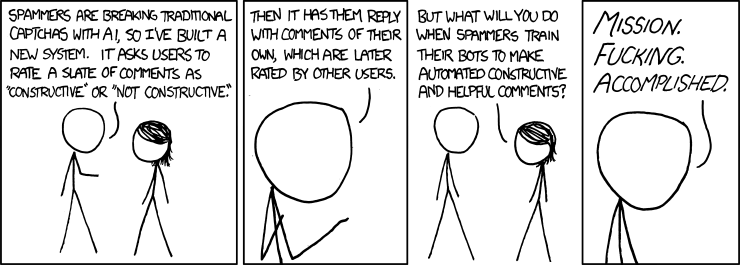Funny thing is, politics has no place outside of the politics site.
As far as the sites proper go - we have fairly focused/limited scopes , various aspects of technology, cookery, life skills. In most cases, the main sites are designed for maximised signal to minimised noise.
For a Troll to actually survive, he has to be pretty clever, and be consistently insightful and constructive

Trolls are rarely that patient.
Where someone does attempt to troll or spam, where its blatant, they're taken down fast and hard. Where it is less so, they're given a fair chance.
However, the issues that shog's talked about are in chat, which is a much more freeform space.
I'm in one of the supposedly better behaved rooms. We have our occasional miscreants, and the occational troll wondering in.
I can primarily speak for/and on Root Access - its the chatroom where I've had the most active influence, and have we've had pretty good success with building room culture.
Firstly, we've typically encouraged the solving of 'issues' immediately. If you're not happy with something that was said, let the other user know what and why. There's no foul, most of the time, unless its repetitive and egregiously bad. In a sense, we try to have a culture of minimal drama.
We also quietly added a few room owners. In addition to mods who're chat regulars, they act as the 'responsible adults'. Once they worked this out (oh, I'm sneaky like that), I've seen them do a great job politely talking down irate users (amusingly one who was mad at me).
We've also found used appropriately Mod tools are handy for exceptions. I've used kicks on disruptive users and suspensions on trolls. However that's negative reinforcement. For most part, I've rarely seen ROs use it, since by the time its needed, you need the big guns.
I believe I once told someone on chat "You need to make the site you want" - what we did might not work everywhere. We built a core of users who know what's expected and more or less guide new users gently to the way things go on chat. That also lets out put out most fires before they get out of hand.
Successful communities are a balance - one of the influences of how I moderate was a admin who was a complete bully who liked to throw his weight around - chasing off core members of the community for no reason. On the other hand, sometimes a mod needs to make the tough decisions, and sheepdog his users.
My right to swing my fist ends where the other man's nose begins.
We encourage honest, open discourse by being aware of others. I've dropped a topic immediately when asked nicely (though I was ever so slightly miffed at the long lecture after that). We realise what's important in community - politicians come and go, but the people we share spaces with are much more important than petty political differences. More often than not, the ability to go "Hey, guys, cool off" or "guys this is not the space for politics" helps a lot.
We build the places we want.

